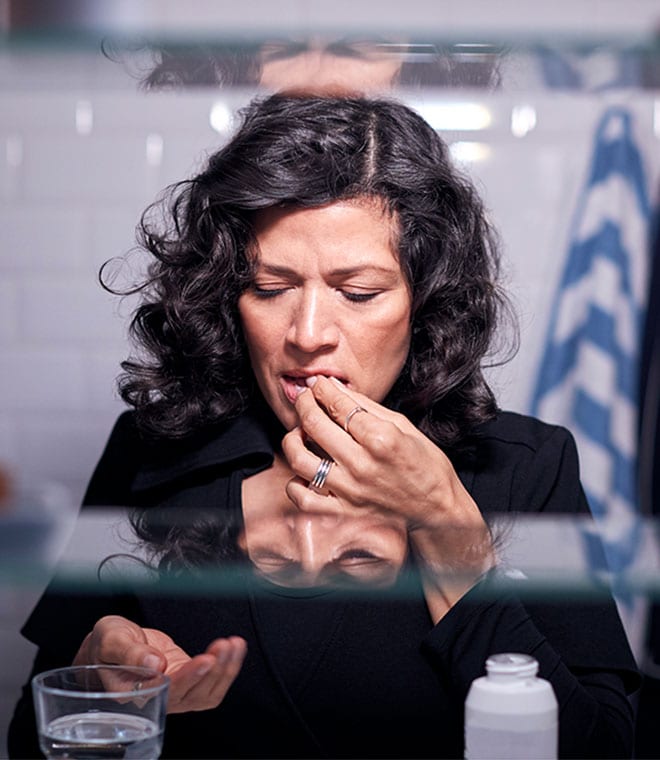Health
Canker sore vs. cold sore: What’s the difference?
By Dr. Anna H. Chacon, MD, Fellow of the American Academy of Dermatology Sep 10, 2024 • 8 min
Two of the most common sores that occur in or around the mouth are canker sores and cold sores. While both of these sores are painful, they aren’t the same thing, and they’re treated differently. Here’s what you need to know about the differences between canker sores and cold sores.
What is a canker sore?
A canker sore (aphthous ulcer) is a common form of mouth ulcer that appears inside the mouth. While women are more likely than men to develop canker sores, anyone can get them. These painful sores often occur on the gums, tongue, inner lips and cheeks, and the roof of the mouth. They are not contagious and can only occur inside the mouth.
Canker sores appear as a white or gray open ulcer with a red inflamed border. They’re sometimes accompanied by a fever or swollen lymph nodes if they’re severe. While it can take one to three weeks for a canker sore to heal, the pain usually decreases after a few days and subsides after a week or so.
What is a cold sore?
A cold sore is a sore that usually occurs on the lips, in the mouth, or in or around the nose. Also known as fever blisters or oral herpes, cold sores typically start out as a tingling sensation at the location where it will develop within a couple of days—sometimes in a matter of hours. Cold sores are contagious from the time they appear until the time they’re fully healed.
The sores appear as small blisters, which are filled with clear fluid. After a few days, the blisters open and weep. Soon they crust over, and the crust hardens. The crust, which is usually yellowish-brown in color, may fall off, and a new crust may develop in its place. A scab begins to form, covering the whole cold sore area. Although the scabbing stage can be embarrassing, it’s the healing stage, a sign that the sore will soon be gone. Over several days, the scab will grow smaller and eventually disappear.
What causes canker sores?
Canker sores sometimes occur along with viral infections. In some cases, they may be linked to immune system problems or food allergies. Often, they appear for seemingly no reason. The reason canker sores develop remains unknown, but a variety of common triggers include:
- Dental work injury
- Acidic foods
- Biting the inside of the cheek, tongue or lip
- Cleaning your teeth too vigorously
- Hormonal changes
- Emotional stress
- Vitamin deficiency, especially B-12, folic acid or iron
- Autoimmune disorders (systemic lupus erythematosus, Crohn’s disease)
What causes a cold sore?
The herpes simplex virus type 1 (HSV-1) is usually the cause of cold sores, although they can be caused by herpes simplex virus type 2 (HSV-2) in some cases. HSV-1 is very common, but only around 20% to 40% of people who have the virus will develop cold sores. However, the virus stays in your body for life, residing on the side of your face in a cluster of nerve cells known as the trigeminal ganglion.
Anyone with herpes simplex can develop a cold sore. Some people may have just one, while others may get them regularly. The first time you get a cold sore, it’s likely to be more severe than subsequent outbreaks.
How do you treat a canker sore?
In general, most canker sores go away on their own, but there are treatments available that may help your symptoms. These include over-the-counter oral numbing gels, pain relievers like acetaminophen and at-home saltwater rinses. For severe canker sore cases, you should see your healthcare provider. They may prescribe chlorhexidine mouthwash or an oral or topical corticosteroid. Recurrent canker sores may be a sign of a chronic condition or something more serious. Your healthcare provider can determine the cause and recommend treatment options.
How do you treat a cold sore?
Without treatment, a cold sore generally lasts around two to three weeks. Keep an over-the-counter antiviral cold sore medication containing aciclovir, penciclovir or docosanol on hand, and apply it as soon as you feel the tingling or itching sensation. This medication may reduce the severity and shorten the duration of the cold sore, and the earlier you use it, the better it will work. Other cold sore treatments include patches and, for frequent or severe cold sores, prescription antiviral medications.
How do you prevent a canker sore?
Because the cause of canker sores isn’t clear, they can’t always be prevented. But here are a few things that might help reduce your risk of developing canker sores:
- Practice good oral hygiene and brush gently using a soft-bristled toothbrush
- Avoid foods or dental products that tend to trigger canker sores, such as sodium lauryl sulfate
- Eat a balanced diet that includes lots of fresh fruits and vegetables
Talk to your healthcare provider if you experience frequent canker sores, if they appear in clusters, begin to spread, are unusually large, or if you have a fever.
How can you prevent cold sores?
While there’s no surefire way to prevent a cold sore, a few things can help:
- Talk to your healthcare provider if you get cold sores more than a few times a year or your cold sores are severe. They can evaluate you and make treatment recommendations.
- Be aware, and avoid when possible, the triggers of cold sores, which include stress, sun or wind exposure, hormonal changes or a weakened immune system due to a cold, flu or other illness.
If you experience frequent cold sores or canker sores, talk to your healthcare provider about preventive medications and strategies. While canker sores and cold sores aren’t the same thing and have different causes, they’re both very common, painful and sometimes embarrassing. When you do develop one or the other, treat it as early as possible with over-the-counter medications to reduce pain and shorten the duration.
Updated by Julie McDaniel, MSN, RN, CRNI, September 2024.
Sources:
- https://medlineplus.gov/ency/article/000998.htm
- https://www.mayoclinic.org/diseases-conditions/cold-sore/symptoms-causes/syc-20371017
- https://my.clevelandclinic.org/health/diseases/21136-cold-sores
- https://www.nidcr.nih.gov/health-info/fever-blisters-canker-sores
- https://medlineplus.gov/ency/article/003059.htm
- https://www.mdanderson.org/cancerwise/canker-sore-vs--oral-cancer--how-can-you-tell-the-difference.h00-159542901.html
- https://www.merckmanuals.com/professional/dental-disorders/symptoms-of-dental-and-oral-disorders/recurrent-aphthous-stomatitis
- https://www.mouthhealthy.org/all-topics-a-z/canker-sores
- https://jada.ada.org/article/S0002-8177(22)00435-4/fulltext



